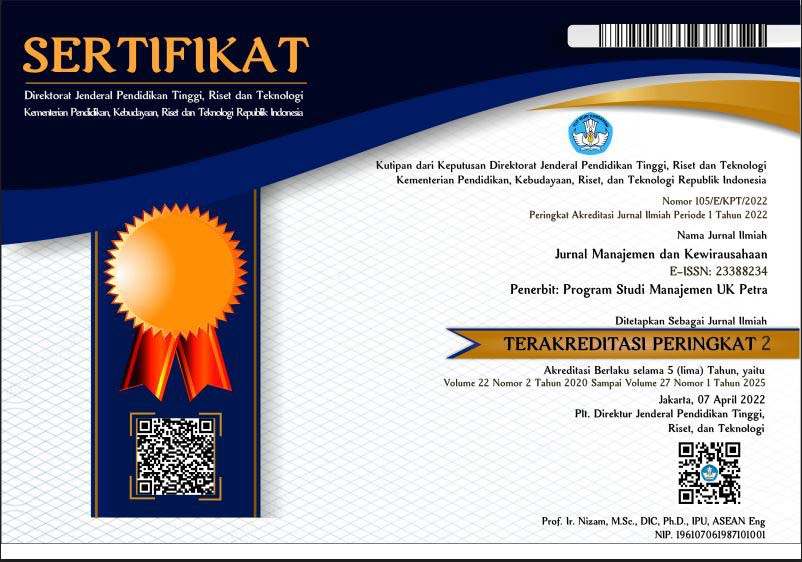REVISITING STUDENTS’ ENTREPRENEURIAL INTENTION IN INDONESIA: A THEORY OF PLANNED BEHAVIOR APPROACH
DOI:
https://doi.org/10.9744/jmk.21.1.64-73Keywords:
Entrepreneurial environment, theory of planned behavior, entrepreneurial in¬ten¬tion, university studentAbstract
The purpose of this study is to verify and measure entrepreneurial intentions among university students as affected by changes in the entrepreneurial environment in Indonesia. The researchers use the Theory of Planned Behavior and the concept of entrepreneurial intention to support the study. The unit of analysis is university students who are currently exposed to changes in the entrepreneurial environment. This study uses a quantitative approach with purposive sampling as the sampling technique. The questionnaire was distributed, and 631 sample responses were received from several universities. The findings show that attitude and perceived control behavior have a significant role in entrepreneurial intention. In addition, subjective norm plays no role in entrepreneurial intentionReferences
Ajzen, I. (1991). The theory of planned behavior. Organizational behavior and human decision processes, 50, 179–211.
Ajzen, I. (2005). Attitudes, personality and behavior. Second ed.. Berkshire, England: McGraw-Hill.
Ajzen, I., & Sheikh, S. (2016). Action versus inaction: Anticipated affect in the theory of planned beha-vior: Erratum. Journal of Applied Social Psycho-logy, 46(5), 313–314.
Armitage, C. J., & Conner, M. (2001). Efficacy of the theory of planned behaviour: A meta-analytic review. British Journal of Social Psychology, 40(4), 471–499.
Biraglia, A., & Kadile, V. (2017). The role of en-trepreneurial passion and creativity in developing entrepreneurial intentions: Insights from Ameri-can homebrewers. Journal of Small Business Management, 55(1), 170–188. doi: 10.1111 /jsbm.12242
Bird, B. (1988). Implementing entrepreneurial ideas: The case for intention. The Academy of Mana-gement Review, 13(3), 442–453. doi: 10.2307/ 258091
Cardon, M. S., & Kirk, C. P. (2015). Entrepreneurial passion as mediator of the self-efficacy to persis-tence relationship. Entrepreneurship Theory and Practice, 39(5), 1027–1050. doi: 10.1111/etap. 12089
Fayolle, A., & Gailly, B. (2004). Using the theory of planned behaviour to assess entrepreneurship teaching programs: A first experimentation. A paper presented in the 4th Annual IntEnt Con-ference University of Napoli Federico II (Italy), 4–7 July 2004.
Fayolle, A., & Gailly, B. (2015). The impact of entre-preneurship education on entrepreneurial attitudes and intention: Hysteresis and persistence. Journal of Small Business Management, 53(1), 75–93. doi: 10.1111/jsbm.12065.
Ferreira, J. J., Matlay, H., Raposo, M. L., Gouveia Rodrigues, R., Dinis, A., & do Paço, A. (2012). A model of entrepreneurial intention. Journal of Small Business and Enterprise Development, 19(3), 424–440. doi: 10.1108/14626001211250 144
Florin, J., Karri, R., & Rossiter, N. (2016). Fostering entrepreneurial drive in business education: An attitudinal approach. Journal of Management Education, 31(1), 17–42. doi: 10.1177/105256 2905282023
Hair, J. F., Black, W. C., Babin, B. J., & Anderson, R. E. (2014). Multivariate data analysis. Harlow: Pearson Education Limited.
Hunter, S. T., Bedell, K. E., & Mumford, M. D. (2007). Climate for creativity: A quantitative review. Creativity Research Journal, 19(1), 69–90. doi: 10.1080/10400410709336883
Iakovleva, T., Nabi, G., Kolvereid, L., & Stephan, U. (2011). Entrepreneurial intentions in developing and developed countries. Education + Training, 53(5), 353–370. doi: 10.11 08/0040091111114 7686
Kautonen, T., van Gelderen, M., & Fink, M. (2015). Robustness of the theory of planned behavior in predicting entrepreneurial intentions and actions. Entrepreneurship Theory and Practice, 39(3), 655–674. doi: 10.1111/ etap.12056/abstract
Kolvereid, L. (1996). Organizational employ-ment versus self-employment: Reasons for career choice intentions. Entrepreneurship Theory and Practice, 20(3), 23–31.
Kristiansen, S., & Indarti, N. (2004). Entrepreneurial among Indonesian and Norwegian students. Journal of Enterprising Culture, 12(1), 55–78.
Krueger, N., & Brazeal, D. (1994). Entrepreneurial potential and potential entrepreneurs. Entrepre-neurship Theory and Practice, 18 (3), 91–104
Krueger, N., Reilly, M., & Carsrud, A. (2000). Competing models of entrepreneurial intentions. Journal of Business Venturing, 15(5-6), 411–432.
Kusmintarti, A., Asdani, A., & Riwajanti, N.I. (2017). The relationship between creativity, entrepreneu-rial attitude and entrepreneurial intention (Case study on the students of State Polytechnic Malang). International Journal of Trade and Glo-bal Markets, 10(1), 28–36. doi: 10.1504/ ijtgm.2017.082379
Küttim, M., Kallaste, M., Venesaar, U., & Kiis, A. (2014). Entrepreneurship education at university level and students’ entrepreneurial intentions. Procedia - Social and Behavioral Sciences, 110, 658–668. doi: 10.1016/j.sbspr o.2013.12.910
Leroy, H. L., Maes, J., Sels, L., & Meuleman, M. (2009). Gender effects on entrepreneurial in-tentions: A tpb multi-group analysis at factor and indicator level. A paper presented at the Academy of Management Annual Meeting, 7-11 August 2009, Chicago (Illinois, USA)
Liñán, F., & Chen, Y. W. (2009). Development and cross-cultural application of a specific instrument to measure entrepreneurial intentions. Entre-preneurship Theory and Practice, 33(3), 593–617.
Liñán, F., Rodríguez-Cohard, J., & Rueda-Cantuche, J. (2011). Factors affecting entrepreneurial intention levels: A role for education. International Entrepreneurship and Management Journal, 7, 195–218.
Maes, J., Leroy, H., & Sels, L. (2014). Gender diffe-rences in entrepreneurial intentions: A tpb multi-group analysis at factor and indicator level. Euro-pean Management Journal, 32 (5), 784–794. doi: 10.1016/j.emj.2014.01.0 01
Moriano, J. A., Gorgievski, M., Laguna, M., Stephan, U., & Zarafshani, K. (2011). A cross-cultural approach to understanding entrepreneurial inten-tion. Journal of Career Development, 39(2), 162–185. doi: 10.1177/0894845 310384481
Nishimura, J. S., & Tristán, O. M. (2011). Using the theory of planned behavior to predict nascent entrepreneurship. Academia, Revista Latino-americana de Administración, 46, 55–71.
Obschonka, M., Silbereisen, R. K., & Schmitt-Roder-mund, E. (2010). Entrepreneurial intention as developmental outcome. Journal of Vocational Behavior, 77(1), 63–72. doi: 10. 1016/j.jvb.2010. 02.008
Paco, A. D., Ferreira, J., Raposo, M., Rodrigues, R. G., & Dinis, A. (2011). Entrepreneurial intention among secondary students: Findings from Portu-gal. International Journal of Entrepreneurship and Small Business, 13(1), 92. doi: 10.1504/ ijesb.2011.040418
Peng, Z., Lu, G., & Kang, H. (2012). Entrepreneurial intentions and its influencing factors: A survey of the university students in Xi’an China. Creative Education, 03(08), 95–100. doi: 10.4236/ce. 2012.38B021
Peterman, N., & Kennedy, J. (2003). Enterprise edu-cation: Influencing students’ perceptions of entrepreneurship. Entrepreneurship Theory and Practice, 28(2), 129–144
Sheppard, B., Hartwick, J., & Warshaw, P. (1988). The theory of reasoned action: A meta-analysis of past research with recommendation for modifi-cations and future research. The Journal of Consumer Research, 15(3), 325–343.
Solesvik, M. Z. (2013). Entrepreneurial motivations and intentions: Investigating the role of education major. Education + Training, 55 (3), 253–271. doi: 10.1108/00400911311309 314
Souitaris, V., Zerbinati, S., & Al-Laham, A. (2007). Do entrepreneurship programmes raise entrepre-neurial intention of science and engineering students? The effect of learning, inspiration and resources. Journal of Business Venturing, 22(4), 566–591. doi: 10.101 6/j.jbusvent.2006.05.002
Townsend, D. M., Busenitz, L. W., & Arthurs, J. D. (2010). To start or not to start: Outcome and ability expectations in the decision to start a new venture. Journal of Business Venturing, 25(2), 192–202. doi: 10.1016/j.jbusve nt.2008.05.003
Turker, D., & Selcuk, S. S. (2009). Which factors affect entrepreneurial intention of university students? Journal of European Industrial Train-ing, 33(2), 142–159. doi: 10.1108/030905909 10939049
Urbano, D., & Aparicio, S. (2016). Entrepreneurship capital types and economic growth: International evidence. Technological Forecasting and Social Change, 102, 34–44.
Veciana, J. M., Aponte, M., & Urbano, D. (2005). Uni-versity students’ attitudes towards entrepre-neurship: A two countries comparison. Inter-national Entrepreneurship and Management Journal, 1(2), 165–182.
Weijters, B., Cabooter, E., & Schillewaert, N. (2010). The effect of rating scale format on response styles: The number of response categories and response category labels. International Journal of Research in Marketing, 27(3), 236–247. doi: 10.1016/j.ijresmar.201 0.02.004
Zhang, Y., Duysters, G., & Cloodt, M. (2013). The role of entrepreneurship education as a predictor of university students’ entrepreneurial intention. International Entrepreneurship and Manage-ment Journal, 10(3), 623–641. doi: 10.1007/ s11365-012-0246-z
Zhao, H., Seibert, S. E., & Hills, G. E. (2005). The mediating role of self-efficacy in the develop-ment of entrepreneurial intentions. J Appl Psy-chol, 90(6), 1265–1272. doi: 10.10 37/0021-9010.90.6.1265.
Downloads
Published
How to Cite
Issue
Section
License
Authors who publish on this journal agree to the following terms:
- Authors retain copyright and grant the journal right of first publication with the work simultaneously licensed under a Creative Commons Attribution License that allows others to share the work with an acknowledgement of the work's authorship and initial publication in this journal.
- Authors are able to enter into separate, additional contractual arrangements for the non-exclusive distribution of the journal's published version of the work (e.g., post it to an institutional repository or publish it in a book), with an acknowledgement of its initial publication in this journal.
- Authors are permitted and encouraged to post their work online (e.g., in institutional repositories or on their website) prior to and during the submission process, as it can lead to productive exchanges, as well as earlier and greater citation of published work (See The Effect of Open Access).

















